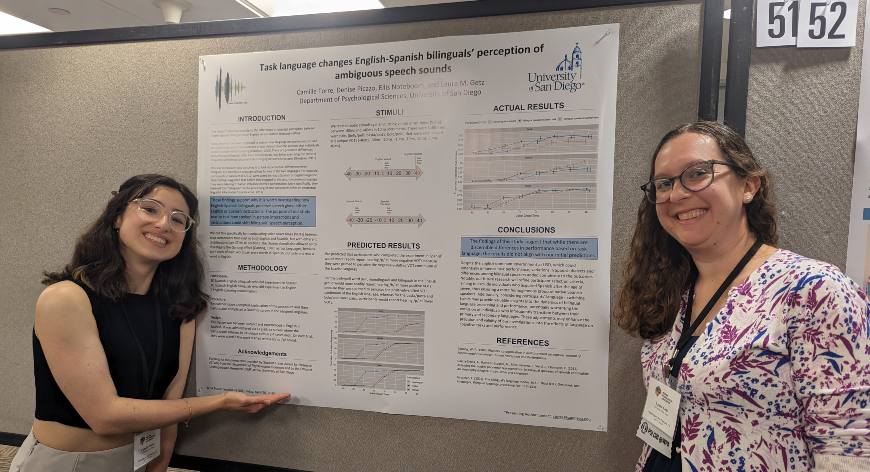STAR Award Recipient Camille Torre Presents Research at WPA Convention
 Camille Torre and Laura Getz, PhD, with Torre's poster
Camille Torre and Laura Getz, PhD, with Torre's posterCamille Torre is a senior majoring in English and minoring in Psychology. With funding support from the Psychological Sciences' Student Travel Award for Resarch (STAR) and the Office of Undergraduate Research, Torre was able to present her research, "Task language changes English-Spanish bilinguals’ perception of ambiguous speech sounds," at the Western Psychological Association (WPA) Convention in San Francisco, California. Attending WPA was an invaluable educational experience for Torre, "I had an incredible time at the conference, where I immersed myself in the diverse research projects of other undergraduate students. I developed close bonds with fellow lab members and my professor. Overall, it was an invaluable educational experience." She also felt lucky to get to meet students in her upcoming master's program.
Read Torre's abstract below:
Variability across speakers and across languages makes speech perception a surprisingly complex task, as there are not exact numerical values you can memorize to determine what speech sound someone is intending at any given time without understanding the speaker context. For example, one acoustic cue is voice onset time (VOT), a measure for the length of different stop consonants. In English, voiced stop consonants like /b/ have short VOTs (around 0ms) and voiceless stop consonants like /p/ have longer VOTs (around 40ms). In Spanish, the same sounds are shifted in VOT, such that /b/ is pre-voiced with a VOT around -40ms and /p/ has a VOT around 0ms. Thus, an English voiced phoneme and a Spanish voiceless phoneme have identical VOTs. This is especially relevant for bilingual speakers, who need to know the rules for phoneme pronunciation in multiple languages. The specific goal of our research project was to investigate how bilingual English-Spanish speakers shift their perceived VOT boundary based on language context. Researchers interacted with participants in either all English or all Spanish, after which participants completed an experiment where they were asked in a two-alternative forced choice task what they perceived for a continuum (from -40ms to +40ms in 10ms intervals) of VOTs using three word/non-word pairs in English and/or Spanish (e.g.,"belly/pelí" where both are words in Spanish but only "belly" is a word in English). We found VOT perception differences between participants completing the task in English and Spanish, especially at intermediate VOTs. For example, with the word pair "belly/pelí", bilinguals in the Spanish group exhibited a rapid switch in categorization around 0ms VOT, consistent with the voiceless boundary in Spanish. In contrast, bilinguals in the English task unexpectedly reported hearing pelí at lower VOTs instead of choosing according to the word belly. Similar trends were observed for the basta/pasta and bolo/polo continuums, although overall the results were not as straightforward as anticipated. Presently, we are employing EEG/ERP analysis to investigate the time-course of how participants perceive sounds differently based on the language of the task.
Contact:
Department of Psychology
psychology@sandiego.edu
(619) 260-4511



